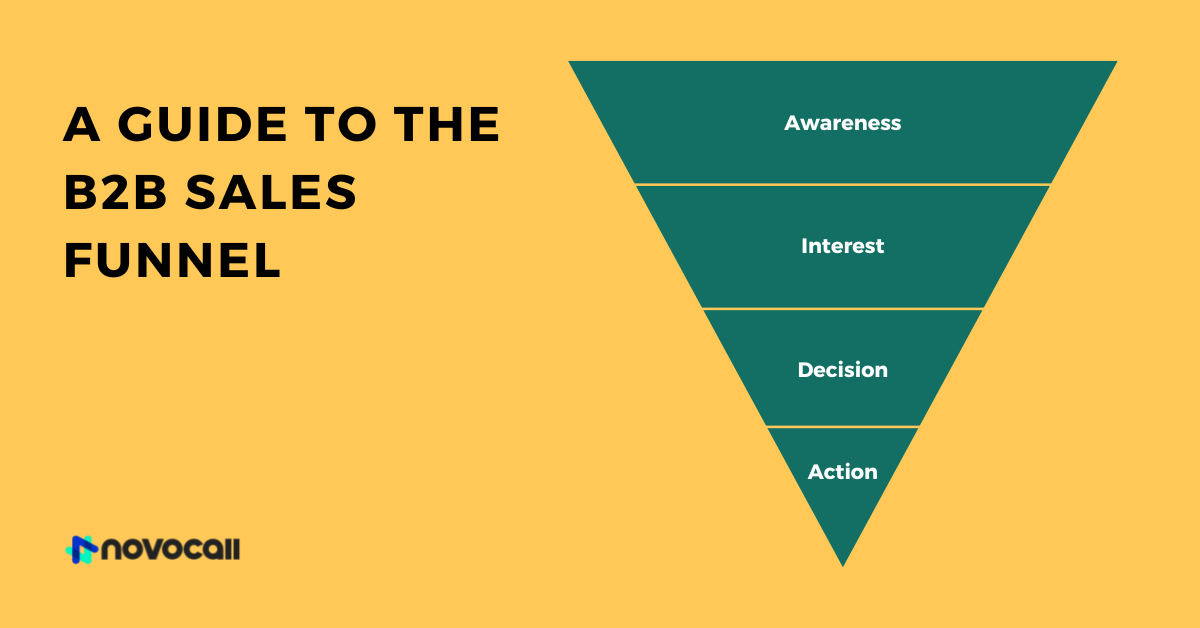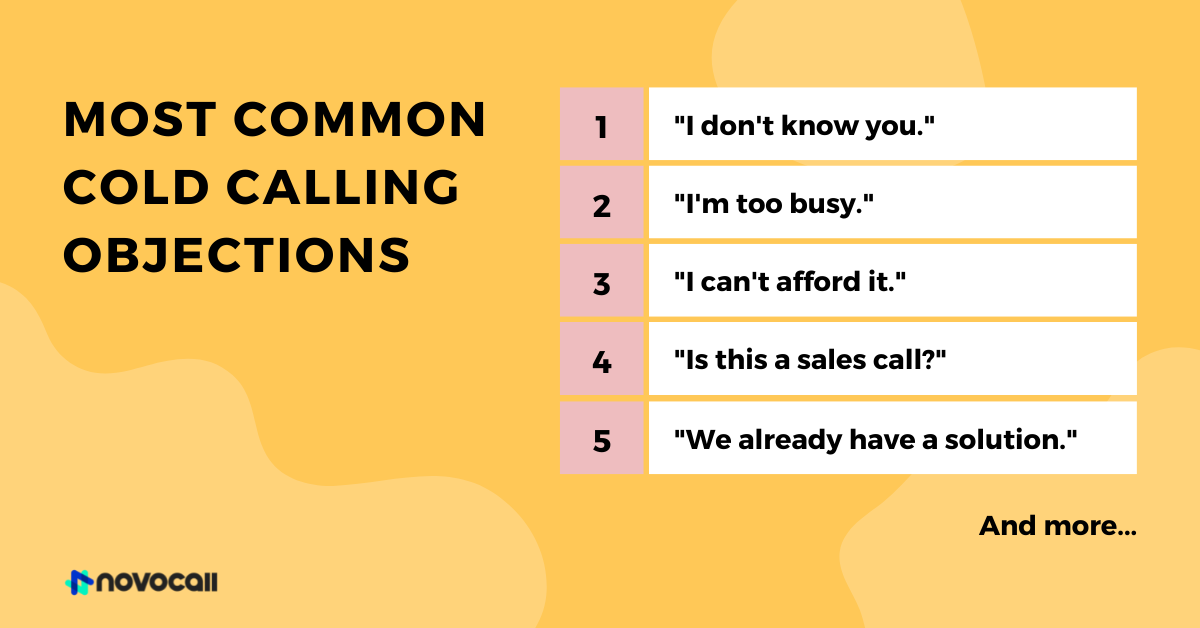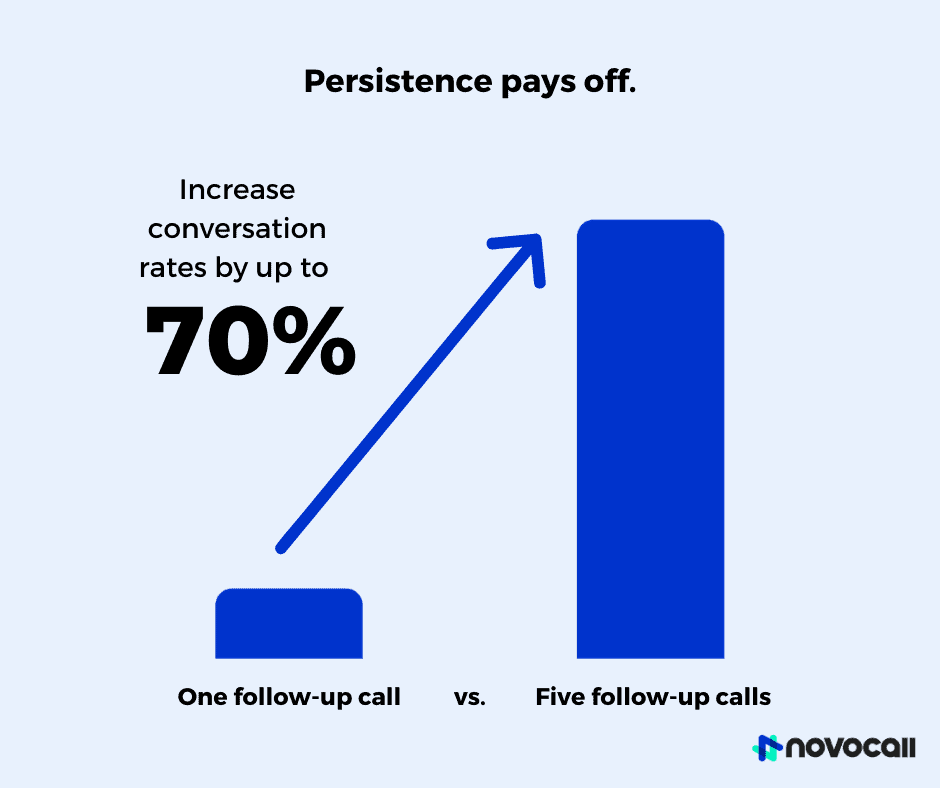


Start driving better conversations.
Novocall will be your new favorite business phone system.

It’s safe to say that most sales reps dread cold calls. Often misunderstood and confused with spam calls, it almost always leads to rejection and rude replies.
But that doesn’t mean you should give up and stop you from pursuing your sales goals.
After all, cold calling remains one of the best ways to generate more qualified leads. Outbound call statistics out there show that the cold calls are far from being ‘dead’ — 82% of buyers would accept a meeting with a rep after speaking with them through a cold call.
That said, this article will walk you through some responses to common cold calling objections and generate more leads.
Do your research and have a solid understanding of your product or service. This will help you answer any questions prospects may have and show that you’re knowledgeable about what you’re selling.
Also, do your research and dig deeper to identify your prospects’ pain points and challenges in their business. This way, you’ll know the true value of what your product or service can offer them.
Be sure to prepare your script ahead of time to know what points need to be made and where the conversation needs to go.
Practicing is critical because it gets you comfortable starting the dialogue and helps you sound more confident. Prospects are likely used to hearing scripted pitches, so keep it conversational and natural.
Practice your cold calling skills with colleagues until you feel comfortable talking about the product or service. Write down responses for common objections and practice how you would overcome these objections.
Authenticity is essential when building long-lasting relationships. Avoid talking too much about yourself and instead, ask questions that open the door to a discussion.
This is about their needs, not about pushing your product or service, especially on the first call.
No one wants to buy from a salesperson who is unsure of themselves.
Be confident in your product or service and in your ability to sell it, whether you just started your LLC or have been running your business over the years. Also, be sure to research on what is the best state to form an LLC in if you’re just starting your business which will make things easier for you in the future.
Remember, you’re an expert in this area, and you have something valuable to offer. Project confidence when speaking with prospects, and they’ll be more likely to listen to what you have to say.
Don’t let a few objections stop you from pursuing a potential lead. By being more persistent, sales reps can increase their conversation rate by up to 70%.

Be persistent in your efforts and stay focused on the goal of landing the sale. If someone doesn’t seem interested, ask them why (but don’t force them for a reason) and find out what it will take to get them on board.
Make sure you listen well and acknowledge any concerns they may have. Perhaps they don’t see how your product or service will benefit them, or they may not understand how it works. You might need to think outside the box, or even destroy the box. Try to find a way to address their concerns and move forward together.
Someone turning you down for your product is not a reflection on you. It’s simply their decision, and there are most likely many other people out there who will be interested in what you’re selling.
Know when to end the call. If the prospect is still not interested after a long conversation, thank them for their time and end the call.
Now that you know how to prepare for a cold call, it’s essential to be ready for the most common objections you’ll likely hear from prospects.
These objections can be frustrating, but they’re also an opportunity to learn more about what the person is looking for in a product or service.
One of the most common objections you’ll face is “I don’t know you.”
You can overcome this objection by providing more information about yourself and your brand. If you’ve shared your social media platforms with them, ensure that they’re up to date and include clear, concise information about what you do.
You can also send a personalized introduction email to potential leads. Leverage the best email marketing software for creating effective email automation sequences and engaging your potential clients.

Another common objection is “I’m not interested.”
You can overcome this by providing value and highlighting the benefits that your product can bring them. Make sure your sales pitch focuses on the customer’s needs and explains how your product or service can help them meet their goals. You can also offer a demonstration or a free trial to show the potential customer how your product works.

Remember, you’re contacting your prospect for the first time and they have little to no prior knowledge of your product or service. They’re probably NOT expecting this call and you might have just caught them in the midst of something.
When shot with “I’m too busy”, don’t try to continue with your pitch — They just said that they don’t have the time for it at the moment. In such situations, try scheduling a time for the potential customer to get in touch with you or offer to make an appointment at their convenience.

💡 Additional read: A comparative analysis of the best times to cold call
We’re not going to sugarcoat it, but these are the most challenging objections to overcome.
In a perfect world, every business would be able to offer discounts, coupon codes, or free trials to every customer to encourage them to try out their product or service. However, if you’re a small business, chances are you can’t always afford to do this.
As a workaround, you could provide additional services at no extra cost or an extended warranty. For example, if you’re a business phone system provider, you could throw in a few extra virtual phone numbers at zero-cost so they won’t be so phased by the price point.
If you’re not able to do that, you could offer a 30-day money-back guarantee. This reassures your prospects that they won’t be charged at all if they feel that your product or service doesn’t add value. This way, they essentially get to try your product for free and you don’t make any extra losses from giving additional services.
But, if you’re constantly hearing your prospects mention that they can’t afford it or “it’s too expensive”, you might want to look into your pricing model and make some adjustments.


When faced with this reply, try asking them for the contact information of the right person. If they’re unable or unwilling to provide it, you could send over your contact information and some brochures about your product or service in a follow-up email.

“Is this a sales call?” can often sound condescending and almost always means they won’t be interested in what you’re going to say for the rest of the call.
However, don’t be phased and feel as if you’re being rejected immediately. The key here is to be completely transparent.
Calmly state that this is a sales call, share more company information, and state that while you’re ultimately pitching your product or service to them, you’d like to first highlight some ways you can solve their challenges.
You can also share how you’ve helped some of their competitors (if applicable) or your most successful clients. Knowing your product’s benefits and industry well can help you provide valuable information to potential customers.

When a potential customer says that they need more information before making a decision, this is your opportunity to provide them with what they need.
Send them a product brochure, case studies, or a price list. You can also offer to schedule another time to get in touch with your prospect again or set up a product or service demonstration so they can see your product in action.

Chances are, you’re not the only provider of your product or service, and your competitor might have already beat you to it.
Fortunately, this can be solved easily if you play your cards right.
At this point, don’t repeat the benefits of your product or service. Your prospect already knows how you can benefit them because your product or service is similar to what they have.
Instead, show your prospect why you’re the better option by highlighting some of your core features. It’ll be even better if you have more mature features or features that your competitors don’t have.
Coupled with some strong case studies to back you up, and maybe if you have the stats to show that they could save more time and money by switching to yours, you should be set.

If a potential customer asks if your product can do something that it cannot, this is an opportunity for you to assess where they are in the sales process.
It would be best to understand how far along the sales cycle the customer is before you make any claims about what your product or service can do. Try asking questions to further understand their needs and why they might need those features.

“We’re not ready to buy” is another common objection, and it’s essential to understand why the potential customer is not ready to make a purchase yet.
You can try asking them about their reason, and what they would need to see or hear before they feel comfortable making a purchase. You can also offer additional information or schedule a time to speak with one of your representatives.
To add to those, offering a demonstration of your product or service can be a great way to make them more inclined to purchase.

Maybe you made a slight mistake or misinterpreted your prospect, and in no way should you feel dejected. This could be an opportunity to learn about a new business and how your product or service might be able to benefit such companies.
That said, when they say that your product or service doesn’t apply to them, this is an opportunity for you to ask follow-up questions to understand the nature of their business better.
If you’ve done your research (good job!) and know that similar companies are using your products or services, you could also highlight this information to your prospect. Maybe they aren’t aware that they’re lagging behind and could use the help of your product or service.
But, if there really isn’t any way your product or service can fit into their processes, don’t force it!

The classic, I’ll-get-back-to-you-but-never response.
Let’s be honest here, most of us have said this before, whether it’s through a cold call or a cold email. It’s a good way to imply that you might be interested, you’re going to think about it, and then you’ll follow up with the sales rep — though you know you won’t.
Now that you’re on the receiving end of this response, here’s how you can overcome it.
Ensure that you regularly follow up with your prospect after the first cold call and check-in if they’re still interested in your product or service. Send some brochures (if you haven’t already done so), or if you can, offer them a discount or free trial.
Some prospects could be genuinely busy and forget about your meeting, hence following up with them can refresh their minds.
Also, don’t forget to schedule a time with them again, or just include your booking link so they can easily schedule a meeting with you without the back-and-forth emails.

If handed 2 options, most people would choose a larger company or one that’s more well-known. It’s human nature to do things with people you trust, know, like, and are familiar with.
Well, this also applies to the business world.
However, don’t be insulted or intimidated by such a response. There are many businesses out there, and it’s impossible to know every single one of them. Or perhaps you’re still relatively new to your industry and have yet to make it big.
In such a situation, you could highlight the background of your company — when you started, country of origin, and maybe some interesting facts about your company.
Now that the prospect is made aware of your existence, you can start to build trust by sharing successful case studies, investor fundings, or any awards you’ve won.

You could have done a great job at explaining how your product or service can add value to your prospect’s business, but sometimes, they might not see the need for it.
You could ask them to elaborate on their current business priorities or why they feel like this isn’t important to them at the moment.

Cold calling objections are common, but they’re not impossible to overcome.
With some preparation and practice, you can easily overcome them and make your next sale. Remember to focus on the needs of the customer and provide value. With a bit of effort, you’ll be generating qualified leads in no time!

Amrapali is a digital marketing consultant who blogs about business and marketing at Bazaar Expert.
Related articles
Subscribe to our blog
Get insights & actionable advice read by thousands of professionals every week.

